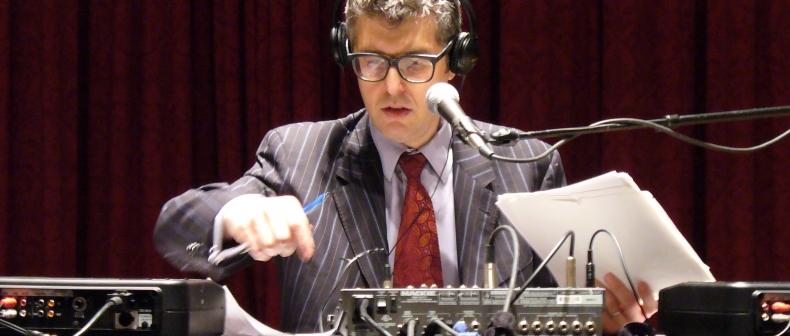
Ira Glass live-mixing (Photo: George Barcos)
By Brianna Goldberg
There isn’t really a way to talk about this without getting intensely personal, so prepare yourself for some oversharing on my behalf. Normally I wouldn’t be so honest so early into our relationship, but this is a topic that demands candour: firstly, we’re dealing with radio, which is all about an intimate connection between the speaker at the microphone and the listener on the other end; secondly, we’re dealing with the concept of public broadcasting, which is as idealistic as it gets; thirdly, we’re dealing with the impetus for, possibility of, and mystical juju required to conjure innovation in radio.
On Saturday night, Ira Glass stood onstage at Massey Hall and, with a few swift pokes at his iPad, presented a musically scored multimedia lecture/sermon about the mission, mechanics and charm of This American Life (TAL). Glass created the weekly radio show in 1995 and still hosts and produces the program (broadcast out of WBEZ in Chicago and in syndication on CBC Radio One) today. A typical episode of This American Life is an hour-long show divided into three “acts,” each relating to a big, meaty theme. Recent episodes include “Loopholes,” “What Doesn’t Kill You” and “Getting Away With It.”
The “acts” generally consist of first-person reported narratives illuminating daily realities of a contemporary conflict or news event, and sometimes essays, comedy or short fiction might be snuck in to provide contrast and balance. It’s sometimes hilarious, sometimes moving, but always quirkily celebratory of the small personal stories behind larger issues being discussed on the evening news.
The result is audio alchemy. I speak to you as a radio lover and radio producer who’s both worked and freelanced at the CBC for the majority of my journalistic career. I know that Q has its hardcore fans, but the cult of Jian simply cannot compete with the hordes of TAL devotees who swoon under Ira Glass’ influence. I think it’s something to do with the way TAL proffers such esoteric and honest stories, demanding both the attention and emotional investment of the listener.
For example, a recent segment (which Glass re-played at the show) featured an Australian teenager who survived a shark attack. Sure, you might hear something like that on other radio shows, but the gist of the short item would be, “Wow, is she lucky to be alive!” The segment on TAL, meanwhile, featured the girl describing, step by step, with patience and pacing and reflection, what it was like to literally barf up her stomach lining. Come on now–that’s compelling radio. After you listen to that piece, it’s as though you’ve experienced said shark-barfing yourself. And Glass, as host and the guy bringing forward these stories to which you emotionally respond, seems like a cool friend who always knows the best pizza place in town.
And so it was that the Saturday night event was stuffed with Glass-ites, feverish and frenzied in a way I haven’t seen an audience in Massey Hall for some time. They were hyped for their public radio rock star. The man’s voice had chuckled on Metro Morning and The Current earlier that week to promote the event, and I felt as though I’d seen, heard, and thought more about the host of This American Life in the past week than I had the upcoming American election. I’m pretty sure every person I ever worked with at CBC was in the audience, plus a heaping handful of my non-radio friends. And he was going to share with all of us, producers and listeners alike, his philosophy for “reinventing radio.” Not sure if you’ve tuned in to CBC radio recently, but that’s a lesson its airwaves are aching for. I mean, yes, that is still The Current‘s theme song. Yes, Cross Country Checkup is still on the air. Something must be done.
On the stage with nothing but himself, a microphone, an iPad, and a bottle of water, Glass walked the audience through the history and values of TAL. He explained their original mandate was to perform the analytical reporting American pubic radio had traditionally done so well, but to “remove the smell of broccoli from the room”–to have fun, to amuse himself and his audience by playing with narrative and suspense. Glass punctuated his thoughts with audio quotes and clips from his iPad, as well as emotionally evocative music beds, accentuating the importance of a point, similarly to how he often does in his packaged radio show. That last bit felt a bit stilted in person, but so thick were the audience’s Glass-goggles that we mostly suspended our disbelief.
He compared a post-9/11 CNN broadcast item reported from a U.S. aircraft carrier, with its booming, Battlestar Galactica-style music cues and threatening narration, against the item TAL featured, interviewing a young girl stocking the aircraft carrier’s candy vending machines. Apparently nobody on that darn ship wanted to eat girlfriend’s Bonkers fruit chews. Glass said that what sets his show apart, and what makes it so special, is that TAL‘s reporters are open to being surprised, to listening to the small stories underneath the big headlines, and to tarrying in the suspenseful unfolding of a tale. He explained that they structure their story segments like sermons — anecdote, anecdote, anecdote, acknowledgement of moral/theme. Where other storytelling formats like TV or film require the audience to make their own assumptions about the “meaning” of a piece, TAL just goes ahead and says it outright, like people do in everyday conversation.
For instance: “I went to this lecture about radio, and this guy who’s very successful said all these great things about how to make a radio story and poked at his iPad a bunch and I was really interested and then I couldn’t help but wonder–how are we supposed to apply these principles to radio here in Canada? Of course everyone wants to hear about what candies the people eat on an aircraft carrier, and be part of radio alchemy, but how does a publicly-funded broadcaster justify spending money on reporting a story like that?”
Ira Glass’ show is pretty amazing, but he admitted that for each episode, their large team of producers chases and reports on at least eight stories, knowing that only three will make it to air. Glass has also mentioned that his show now sets aside $60 000 in the budget for fact-checking alone. Could you imagine justifying that in a CBC budget? The government would either laugh or puke (depending on who’s in power).
But, then again, Glass doesn’t have to justify his show to the government–American public radio is largely supported by foundations, private donors, pledge drives–and that means the kind of people who desire smart, rigorous, complex and entertaining radio shows are putting up the cash to be able to listen to smart, rigorous, complex and entertaining radio shows. There are just so many more people in the U.S. to make such a thing possible. Of course, NPR and its local affiliates are dealing with budgetary constraints of their own, but TAL is still on the air. And touring to frenzied crowds in Canada. Talking about their amazing reinvention of radio.
It is a real frustration for me. And here comes the over-sharing part: I want to make radio like that in Canada–smart, rigorous, complex and entertaining shows. I listen to and love what’s on the airwaves now, but when I hear innovative programs like TAL or Radiolab I get fire in my gullet and think, let’s do that on our radio! Let’s make something beautiful and challenging. Granted, there are some awesomely wacky shows like Spark that push against the Cross Country Checkup paradigm. But I’ve worked with CBC Radio development four times in the past few years, meaning I’ve drafted and piloted new show concepts for consideration. The place is brimming with young producers who want to do the same as me. And so we pitch, and we develop, and yet where to put the experimental results?
Because CBC has to account for its pennies being spent in the general public interest, it is risky, beyond risky, to invest in new projects that might not be meaningful to “all Canadians”–you know, the “all Canadians” whose pennies are automatically invested in the CBC. “All Canadians” don’t care so much about Bonkers on aircraft carriers and shark attack pukes. And once an investment is made into something new at CBC, since the political stakes are so high, that precious radio baby can become so closely parented as to smother any potential for innovation at all. (I also worked at Radio 2 shortly after the switchover to playing modern music. Eek!)
So if Massey Hall was sold out, as it looked like, there are now about 2700 Canadians who know how to “reinvent radio.” Where is that going to happen? Not with the public broadcaster. Because to foster innovation, creators must have the freedom to try and fail until they get something really right. And to that end, I do actually think the answer was provided in the first five minutes of the Glass event:
“I have a theory that no one in Canada actually hears us on the CBC,” said Glass. “Clap if you listen to This American Life on the podcast.” The venue shuddered with applause. “How many people listen on CBC?” A cough. A few claps. An awkward pause.
And there will be an awkward pause as the people who organize things like “broadcasting in Canada” come to realize that the power is no longer in the transistor towers. It is a little heartbreaking–okay, a lot heartbreaking – for people like me who want so badly for exciting Canadian public radio to be a viable career and a viable content source. But in the meantime, I look forward to a generation of new, interesting, challenging, complex, entertaining, heart-rending, totally unabashedly in-love-with-radio podcast programs…that don’t exist on the radio, and don’t have to answer to anyone but an invested, earnest listener.
____
Brianna Goldberg is a writer and radio producer from Toronto. You can follow her on Twitter at @b_goldberg.
For more, follow us on Twitter at @torontostandard, and subscribe to our newsletter.














